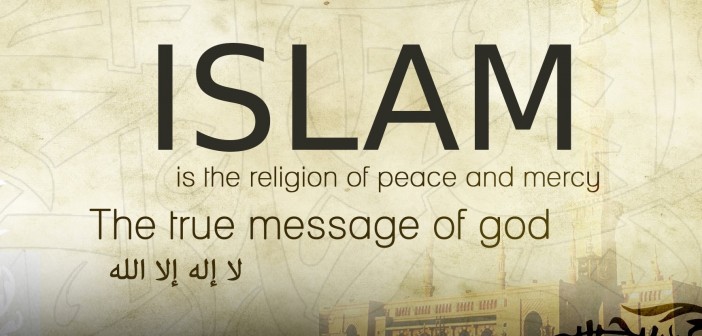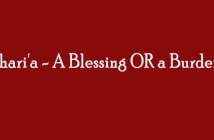A Muslim Believes in the following
- One God (Allah); (God has no partners and associates. He is worshipped alone.)
- The Angels;
- The Holy books; which Allah has revealed on various messengers of Allah.
- The messengers of Allah; such as Adam, Noah, Abraham, Isaac, Ishmael, Moses, Jesus and the last messenger of Allah Muhammad (peace be upon them)
- The fate; whether it is good or bad it is from Allah
- Resurrection; after the death (Hereafter)
Once a person announces that he or she believes in the above mentioned items. He or she is considered to be a Muslim. A Muslim must also;
- Believe in all the attributes and characteristics of Allah
- Accept all the commandments of Allah
- Perform mandatory prayers five times a day
- Fast during the month of Ramadan
- Pay poor-due (Zakat)
- Perform Hajj (if he/she can afford) once in a life time.
After declaring the above items by tongue if a Muslim practice these believes she / he is considered as a believer (Mo’min).
Who is A Mo’min (Believer)?
A Mo’min is that Muslim whose heart verifies what he / she says. In other words a practicing Muslim is a Mo’min. Mo’min has the following characteristics.
- Practices what he / she says.
- Accepts which is Halal (allowed by Allah) and stays away from Haram (forbidden by Allah).
- Turns to Allah in all his / her matters and seek help from him.
- Does his / her best for achieving his / her right goals and leaves the result up to Allah
- Always expects the best from Allah.
- Always seek the pleasure of Allah through prayers and good behavior.
- Loves Muhammad (peace be upon him) more than any thing else in this world.
- Follows the sayings and actions (Sunnah) of Muhammad (peace be upon him) in his/her life.
- The family, the children, the companions and the followers of Muhammad (peace be upon him) are very dear to his/her heart.
- Obeys and respects parents (except when parents ask some thing which is against the teachings of Islam)
- Loves those who love Allah and his messenger Muhammad (peace be upon him) i.e. Aowlia Allah.
- Tries to help other fellow human beings with his/her resources (Sadaqah)
- Preach good (Ma’roof) and try to stop evil (Munkar)
- Through his / her tongue, hands and behavior his neighbors, his family and his community is safe.
- Very sensitive about the environment. He / she tries not to cut trees, not to kill animals and birds for fun (except for food in the name of Allah only), not to waste food and water, not to contaminate water, air and soil.
- Respects human life.
- Believes in equality of people in terms of their mutual rights and knows that the most honorable in the sight of Allah is the one who is the most pious among people regardless of his / her color, race and gender.
- Respects other people’s property and privacy.
- Have patience, tolerance and care for other companions of this earth.
- Always greets and smiles when he /she meets his/her Muslim brothers, sisters and other friends
- Walks on earth humbly, does not shout and does not show-off
- Very faithful to Allah, to Prophet Muhammad (peace be upon him), to parents, to family, to his religion and community.
- Keeps his / her lawful promise
- Fears only Allah
- Look forward to meet his creator and enjoy his companionship in heavens.
- Does not get involve in backbiting, gossiping, lying, blaming, supporting or participating in any Haram (forbidden) action for example a Muslim must not take / eat / drink the following.
- Taking Interest on investments or savings or any other form.
- Drinking Alcohol
- Eating pork or pork products
- Eating dead animals (which are not Islamically slaughtered).
- Drinking blood
- Any animal’s flash which is slaughtered in the name of someone other than Allah.
A Muslim may eat little bit of the above if it is a matter of life and death and no Halal food is available.
Who is a Mohsin?
When a Mo’min remains consistent in his behaviour and prayers, he is raised by Allah to a higher level of Eman (Faith) which is Ehsan. A person at the stage of Ehsan is called Mohsin. According to a Qur’anic verse in Surah Al-Baqaraha, a person who completely submits him/herself and turns his / her face only towards Allah he /she is Mohsin. According to a Hadith of Prophet Muhammad (peace be upon him) a person at the stage of Ehsan offers his/her prayers in such a state as if he/she is seeing the Creator.
The stage of Ehsan is accomplished through self-purification process, which is called “TAZKIA TUN NAFS“. The science of “Tazkia Tun Nafs” is called Tasawuf or in the Western World it is famous as Sufi-ism. Tasawuf or Sufi-ism is Islamic. One should not separate Tasawuf from Islam. There are some people who separate Tasawuf from Islam or Islam from Tasawuf. Either they have misunderstood Tasawuf or Islam. In our opinion, any thing in the name of Tasawuf (Sufi-ism) which is out side the boundaries of Islamic Shari’a is not Tasawuf or Sufi-ism.
In another Hadith Prophet Muhammad (peace be upon him) said that when a Mo’min performs optional prayers in addition to the mandatory prayers, a stage comes in his / her life that when he/she touches the things they touch them with the hands of Allah, when they see the things they see with Allah’s eyes, when they walk they walk with Allah’s feet. What’s that means? It means that such a person does not see any thing which is forbidden by Allah, he /she does not touch any thing which is forbidden, they do not go to the places which are forbidden. In other words, he /she is at the stage where they do not do any thing against the will of Allah. This stage is also called “Fana Fillah” in Tasawuf.
To get to the level of Ehsan, which is recommended by Islam, one has to follow the ways of Sufis. Sufis are the saints of Islam ( in Qur’an Allah has called them Aowlia Allah- friends of Allah) who followed the Sunnah of Prophet Muhammad (peace be upon him) in their lives and never deviated from the path of Islam.
For more information on Tasawuf and Sufi-ism please click on Tasawuf on the Homepage.






